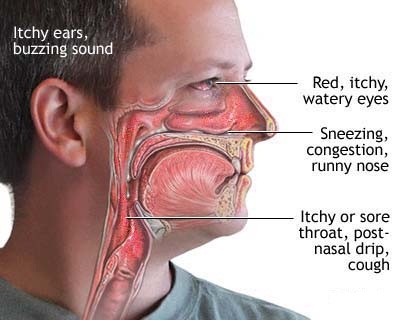Get some natural home remedies for post nasal drip cure, sore throat, allergies and sinus infections.
Post-nasal drip (PND) is a common problem that occurs due to excessive mucus production by the nasal mucosa. It’s a very irritating and uncomfortable situation to deal with and can affect people of any age
Post nasal drip occurs when a large amount of mucus gathers in the back of the nose and throat, giving the sensation that mucus is dripping from the back of the nose. Post nasal drip can cause several ailments in children, including a sore throat or a cough that does not seem to go away.
A hacking cough, a sore throat, or simply a “tickle” in the back of your throat can be a signal that you have postnasal drip. Colds, flu, and allergies are the main causes of postnasal drip. Air pollution and dust are also common culprits.
What is Post Nasal Drip (PND)
When your baby has woken for the third time during the night, and you notice the congested breathing and difficulty sleeping as the telling signs of post nasal drip. Post nasal drip occurs when the nose and throat produce mucus continually and can’t be swallowed or expelled through the nose, causing it to build up and bother your infant.
Because infants can’t blow their noses, post-nasal drip can become a challenge. By using some home remedies, post nasal drip can be relieved and everyone can look forward to a good night’s sleep.There are a few options to treat post nasal drip; however, receive your pediatrician’s approval first.
Post-Nasal Drip Remedies at home naturally
Below are some of the best Post-Nasal Drip Remedies which you can use at home to naturally cure PND:
-
Gargle with Salt Water
Gargling with salt water is one of the best natural remedies for post nasal drip to ease the discomforts of post-nasal drip. It helps thin the mucus, making it easier for you to get rid of it. It also flushes the irritants out of the nasal passages.
- Add ½ teaspoon of salt to 1 cup of warm water.
- Stir thoroughly until the salt dissolves.
- Gargle with this solution a few times daily for 2 to 3 days.
-
Steam Inhalation
Antibiotics are not necessary for most common colds and coughs. If your child has a fever along with post nasal drip, it is a good idea to contact your doctor, especially if it is over 103 degrees for three or more days. He finds a good solution for at home help is to steam out the mucus. Closing the bathroom door and turning the shower to hottest setting creates a steam room. Sit in the bathroom for 10 to 15 minutes, which will help loosen mucus.
Steaming every morning and before bed, as well as during the day as necessary. While sitting in the bathroom steaming, putting the infant’s back and chest, harder than burping, will help loosen any mucus that might have collected in the lungs.- Make a bowl of hot, boiling water.
- Optionally, add a few drops of any essential oil.
- Drape a towel over your head and hold your face over the hot water.
- Deeply inhale the steam for about 10 minutes, then blow your nose.
- Do this 2 or 3 times daily until you recover completely.
-
Nasal Irrigation
Nasal irrigation also helps clear up excess mucus. It even helps keep the nasal passages free from irritants and prevents further infection.
- Add ¼ teaspoon of salt and a pinch of baking soda to 1 cup of warm distilled water.
- Fill a neti pot with this solution.
- While standing over a sink, tilt your head to one side and squirt the solution into one of your nostrils.
- Move your head back, forward and side-to-side to help the solution reach your nasal cavities.
- Blow your nose to remove excess mucus and solution.
- Repeat the process with the other nostril.
- Do this once daily for a few days and then a few times a week.
-
Garlic
Garlic is a potent herb with powerful antibiotic properties. It helps control overproduction of mucus and prevents infection. It even promotes quick recovery.
- Chop 3 to 4 garlic cloves and roast them in 1 teaspoon of clarified butter for 1 minute. Eat them with warm milk twice daily for a few days.
- Another option is to chew a small piece of raw garlic a few times a day.
- You can even take garlic supplements after consulting your doctor.
-
Ginger
Ginger is a natural decongestant and contains antiviral, antibacterial and expectorant properties. It helps reduce the overproduction of mucus and aids its expulsion. It also helps relieve chest congestion, hoarseness and a sore throat, common symptoms of post-nasal drip.
- Drink ginger tea 2 or 3 times a day. To make the tea, put 1 tablespoon of sliced ginger in 1 to 2 cups of water and simmer on low heat for 10 minutes. Strain, add a little raw honey and drink it.
- You can also chew raw ginger slices several times a day and add ginger to your cooking.
-
Cayenne Pepper
Cayenne pepper acts as an antihistamine and helps treat post-nasal drip. The capsaicin in cayenne helps thin the mucus for easy elimination. It even helps soothe an irritated throat.
- Mix ½ teaspoon each of cayenne pepper and honey and have it 2 or 3 times daily for a few days.
- Alternatively, add ½ to 1 teaspoon of cayenne pepper powder to a cup of warm water and sip it slowly. Repeat a few times a day.
- Include cayenne pepper in your cooking as well.
Removing Excess Build-Up
The best way to alleviate post nasal drip is to remove as much of the mucus as possible. It is suggested that using a soft rubber suction bulb (aspirator) to remove secretions. If the excess mucus is clogging the back of baby’s throat, causing coughing or discomfort, you can use the bulb to rinse the nose and clear the throat.
By gently dropping one to two drops of saline, a salt, and water solution, into the nose and then suctioning out the mucus and saline, an infant’s nose and throat can be cleared of post nasal drip mucus. Thoroughly clean the bulb syringe after each use.
Vaporizer and Chest Rub
During the nighttime, a hot steam vaporizer will help keep the nose clear. Researchers suggest that hot steam instead of a cool mist humidifier and to air out the room during the day to keep the humidity out. Parents.com suggests a chest rub with eucalyptus or mint to help ease congestion and break down mucus.
Applying a small amount before bed can aid in a better night’s sleep. Some rubs may be too strong for infants, so use sparingly and watch for adverse reactions such as sneezing, rubbing the eyes or wheezing. Clean and disinfect all bottles and pacifiers while the infant has to post nasal drip to stop potential infection.
- Decrease exposure to any allergens. Certain allergens can cause your child to suffer from post nasal drip. Eliminate or reduce her exposure to dust mites, pollen, mold, and dander from animals.
- Place a humidifier in the child’s room. A humidifier can help break up the mucus that is caused by his post nasal drip. Turn on the humidifier at night while the child sleeps and when symptoms tend to worsen.
- Eliminate the child’s exposure to any nasal irritants. If the child is suffering from post-nasal drip, keep her away from cigarette smoke, perfumes, and aerosol spray. These substances can aggravate her symptoms.
- Use a saline nose spray to treat post nasal drip in children. Look for specially formulated versions that are meant to be used on children. Squeeze the bottle and allow the mist to enter the child’s nasal passages. Use as directed by your pediatrician.
- Treat the underlying cause. If the doctor determines that the post nasal drip is caused by an infection, antibiotics will be administered to the child to treat the problem.
- Give him a dose of an antihistamine based on his age and weight. If the post nasal drip is allergy related, your doctor may allow you to treat it with an over-the-counter antihistamine. The pediatrician may recommend children’s Benadryl.
- Soup is a soothing, comforting meal option when your toddlers are experiencing post nasal drip symptoms like a sore throat and difficulty swallowing.
- Keep your baby hydrated; not only will drinking the proper fluids help soothe a sore throat,it should help to clear away a lot of the mucus buildup.
 Health & Care Information
Health & Care Information 


